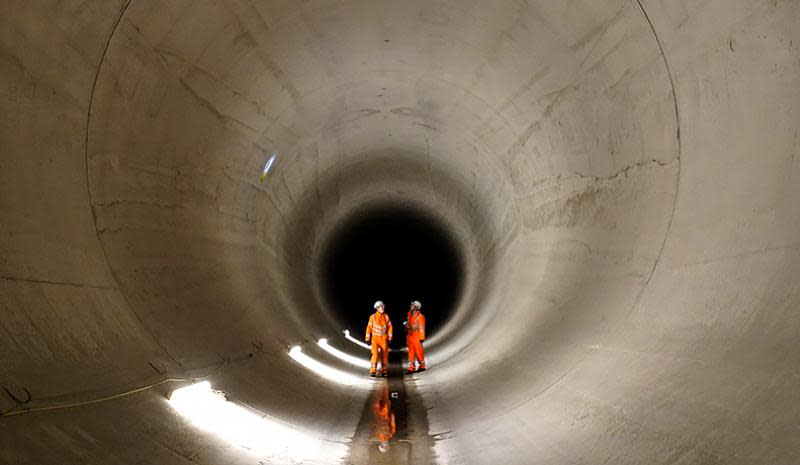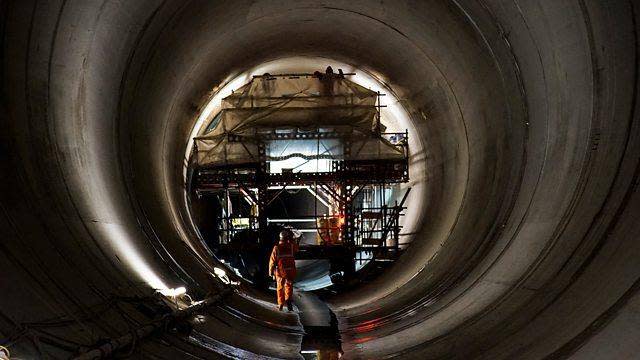TV Review, The Five Billion Pound Super Sewer (BBC2): Beauty in motion

Do you ever wonder what happens after you’ve flushed?
Probably not, I realise, because you have far nicer things to think about, such as, let’s say, Alex off Love Island, the christening of HRH Prince Louis or the second referendum on Brexit. I’d say that’s partly why you don’t spend time figuring out the route your foulage will take on its way to its beach holiday.
The other reason is that we take our sewer system so much for granted. Yet, as we also know, it is literally crumbling in some places, pushed to destruction by the emergence of the modern “fatberg”, a grim amalgam of sewage, nappies, used towels and, well, fat and congealed grease. The last fatberg to hit the London sewers weighed the equivalent of 11 double decker buses and stretched the length of two football pitches. Imagine giving birth to that.
So: time we got our, er, stuff together. Hence some major investment in the network, and hence The Five Billion Pound Super Sewer that is currently being completed under the capital, and the subject of this “fly on the wall” (appropriate, that) BBC documentary.
Invented by the Victorians, our old sewer pipes are still in surprisingly good condition, considering what you/we chuck/force/dump down the loo. They do their jobbies beautifully, in more ways than one. At one point we were allowed in to the Romanesque glory of the Abbey Mills Pumping Station, aka “the cathedral of sewage”, which ought to be a hotel or luxury flats. As it happens the then Mayor of London Boris Johnson was there to push a button that would dump millions of cubic metres of toxic material into a newly built extension. It seems a fitting metaphor for his activities since. Something about “going through the motions” was Boris’ double entendre. Well, Boris, funnily enough, you still are, in every sense of the term.
London’s system was commissioned after the Great Stink of 1858, when the Palace of Westminster itself was surrounded by human waste (I won’t flog the joke). The chap responsible was a brilliant engineer named Joseph Bazalgette, who saw no reason why health and beauty should be overcome by any fetid reality. By the way, his descendant is the TV executive Peter Bazelgette, who was responsible for pumping fetid reality TV such as Big Brother, Ready Steady Cook and Changing Rooms into our homes, and thus partly reversing the work of his great-great-grandfather.
The Bazalgette (Joseph) system was constructed in the 1860s for a population of about two million. Now it is trying to cope with nine million people’s “output”. Just take a moment, maybe when you next find yourself parked on the throne, possibly as you are reading this, to consider how many millions of individual small miracles every day, every week, every year, the sewer system has to perform to ensure that things don’t get as stinky as they used to.
I’ll help you out, if I may: on average, the equivalent of 300 Olympic swimming pools of raw sewage overflows into the Thames every week. That’s just the amount the seers can’t cope with. Because the sewers are working so close to their capacity, they become inundated when there’s heavy rain. The sewer folk (by which I mean these are the dedicated public servants who run the system, not that they deserve to be denigrated by such a shorthand description) then have a choice. Sort of. They can either allow the toxic waste leave the sewers system to go straight into the rivers, catching rowers and pleasure boaters as splashes into their path; or they run the considerable risk that, if they don’t open up any of the 50 overflow hatches that run into the Thames, then the overflow will back up the pipes, through the U-bend and spill into your bathroom, where you can say hello to that brown trout you’d thought you’d seen the back of after it first went its way in a swirl of Brobat Bloo.
The solution is to retain the sewage safely in the system, which means creating extra tunnel, pumping and storage capacity. This is what this 20-mile-long mega pipe under the Thames does, along with its huge associated machinery and storage vats, will achieve. That’s one way of making the UK Brexit-ready I suppose.

“Pumping poo with panache” is how one of the jolly civil engineers described their jolly mission to clean up Britain’s jolly old sewers, and I had to admire their gameness to go neck-high in toxic sewage in the “poo pit” as they call one of the main treatment tanks down at the sewage farm (such a wonderfully bucolic euphemism, that, in this underworld kingdom of gentle lavatorial humour).
Because no one has yet perfected “smellyvision” (only a matter of time, I know), I was perfectly OK watching all this while having my dinner. It was only when one of the engineers started casually describing his excursion into the “poo pit”, like he was Judith Chalmers on some dirty protest, and how he had first to penetrate a “crusty layer”, that I had to just push my plate of chicken korma to one side, just for a moment, while I rebuilt my appetite. (During which phase I did have to keep poking at the curry, so as to ensure that it didn’t itself acquire a crusty layer.)
It’s not easy to make sewage photogenic, so the producers are to be congratulated on turning what is a naturally repulsive subject matter into mostly enjoyable viewing, thanks to some deft scripting and excellent photography that revealed the marvellous scale of the project. It was a highly crafted first episode of three, and, to borrow another of Boris’ lines, proof that you can, in some circumstances, polish a turd. Billions of ’em, in fact.
Now wash your hands.


